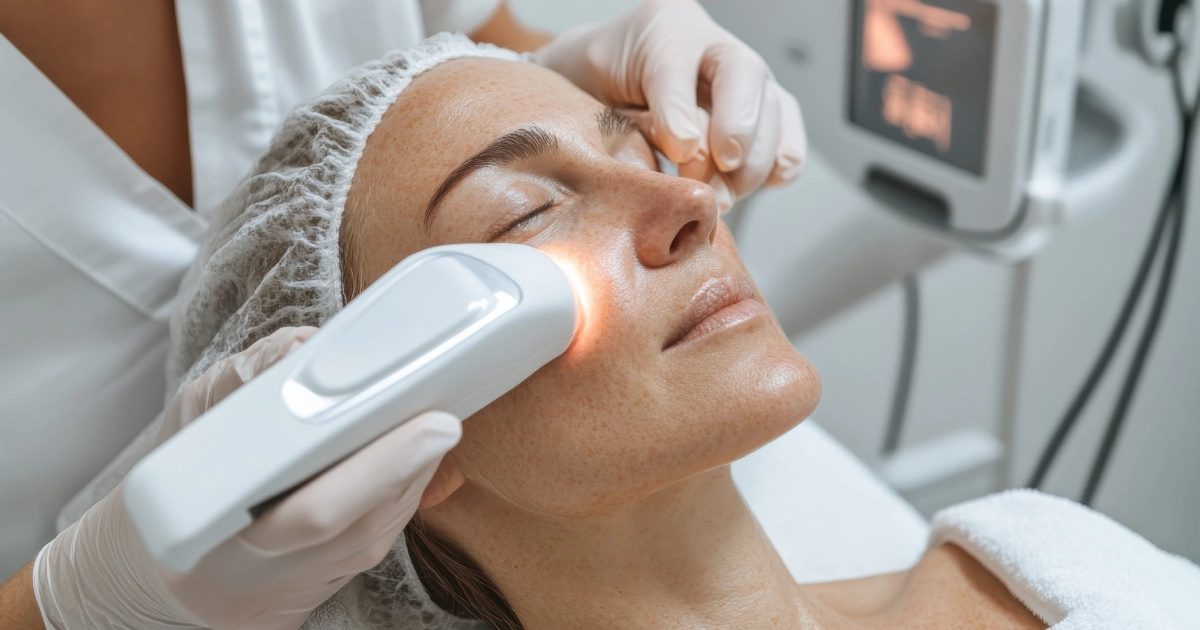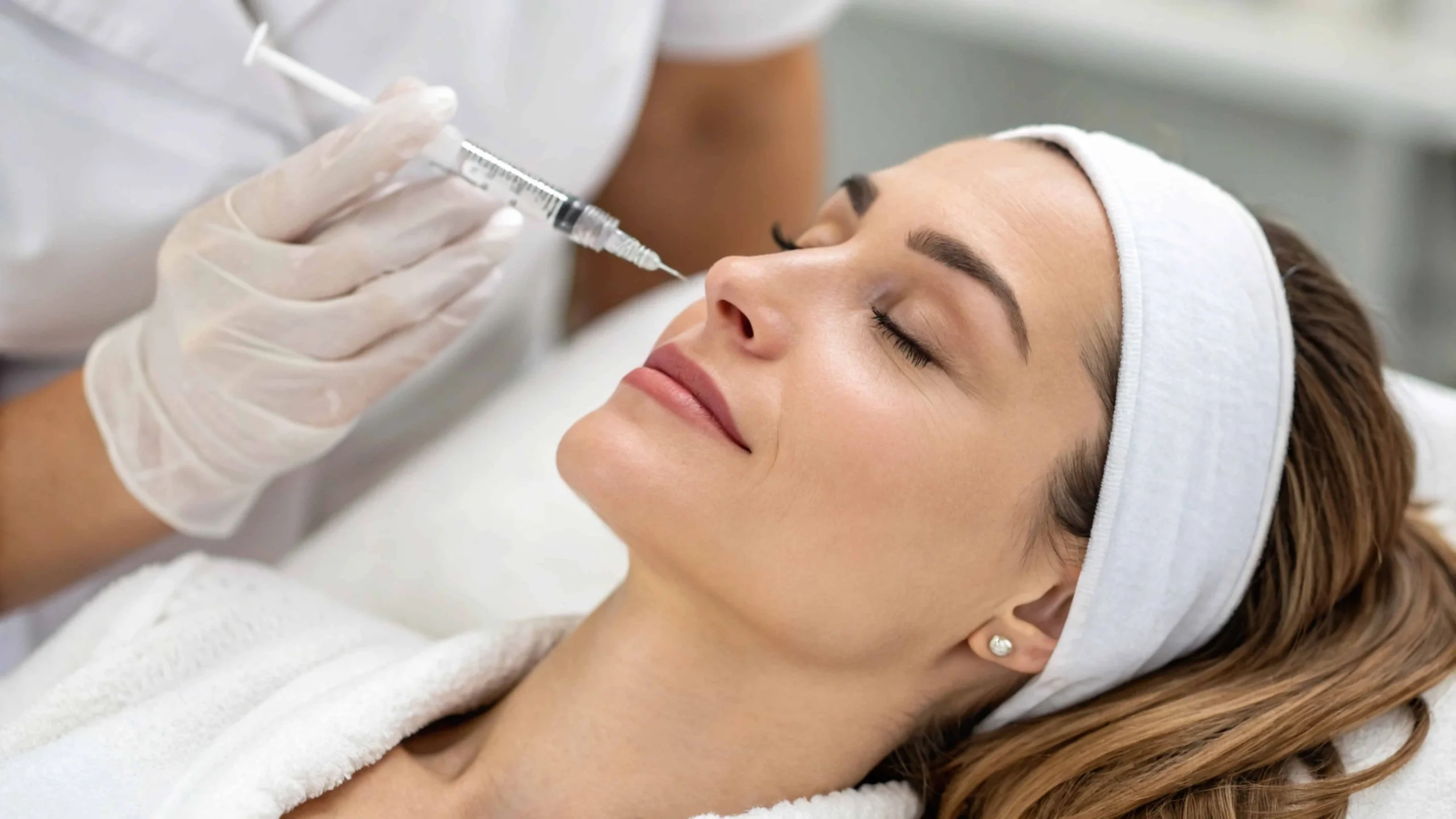Table of Contents
You’re not alone if you’ve been frustrated by dull skin, fine lines, uneven tone, or breakouts that never seem to go away. Many beauty—and wellness-conscious individuals want real, lasting results, not just short-term fixes.
Whether you’re noticing early signs of aging, struggling with sun damage, or enjoying a glow beyond a makeup routine, a chemical peel in Washington, DC, is the solution. Still, with so many treatment options available, it’s easy to get overwhelmed. How do you know if your skin is suitable for a chemical peel? What about sensitive skin or darker skin tones?
At Ritual, informed choices lead to better outcomes. In this guide, we’ll break down who can benefit from a chemical peel, which skin types are most compatible, and how to make the best decision for your skin.
What Is a Chemical Peel?
A chemical peel is a non-surgical skincare treatment that uses a specialized solution, usually containing acids like glycolic, salicylic, or TCA, to exfoliate the top layers of the skin. The aim is to remove dead skin cells, stimulate collagen production, and reveal fresher, brighter, and smoother skin underneath. Depending on the depth and formulation, chemical peels can target a variety of concerns, including:
- Fine lines & wrinkles
- Hyperpigmentation and dark spots
- Acne and acne scars
- Uneven skin tone
- Rough texture and dryness
- Sun damage
Who Should Get a Chemical Peel?
Chemical peels are typically suited for individuals with healthy skin who are not pregnant, breastfeeding, or using medications like isotretinoin. Most skin types—including those with darker skin tones (Fitzpatrick I–VI)—can be safely treated with formulations like the Perfect Derma Peel offered at Ritual.
Best for individuals with:
- Hyperpigmentation or melasma
- Sun damage or age spots
- Acne scars or mild to moderate breakouts
- Fine lines and wrinkles
- Uneven skin tone or rough skin texture
- Dull or tired-looking complexion
- Enlarged pores
However, a professional consultation is essential to determine the appropriate depth and formulation based on your skin condition. You don’t have to navigate skincare alone. At Ritual, our aesthetic nurse practitioner prioritizes your safety, comfort, and desired results, tailoring every treatment to your skin’s unique needs.
Who Should Not Get a Chemical Peel?
While chemical peels are versatile, they’re not for everyone. You should avoid getting a peel if you:
- Are you pregnant or breastfeeding
- Have an active skin infection (like cold sores or open acne lesions)
- Are you currently taking Accutane, or have you taken it within the past 6 months?
- Have a record of keloid scarring or poor wound healing
- Recently underwent another invasive skin treatment (like laser resurfacing)
Sharing your complete medical and skincare history during your consultation is also essential. This allows your provider to customize your treatment and avoid any potential risks.
The Advantages of a Chemical Peel
Before diving into who should or shouldn’t get one, let’s look at the advantages of a chemical peel:
- Non-invasive with minimal downtime (especially for light-to-medium depth peels)
- Customizable based on your skin type and goals
- Improves skin texture and tone visibly after just one session
- Stimulates natural collagen production, aiding in skin regeneration
- Compatible with other treatments like microneedling or facials
Chemical Peel Skin Type Guide
1. Normal Skin
People with normal skin usually tolerate most types of chemical peels well. They often choose medium-depth peels that provide noticeable results with minimal risk. You’re likely a strong candidate if you’re looking to refresh your glow or treat minor imperfections.
2. Oily and Acne-Prone Skin
This skin type can benefit significantly from chemical peels. Salicylic acid peels, for example, help unclog pores, reduce inflammation, and control excess sebum production. A customized peel might provide long-term relief if you’re tired of recurring breakouts or acne scars.
3. Dry or Dehydrated Skin
If your skin is dry, you can still undergo a chemical peel if you do it carefully. Gentle formulations with lactic acid can help exfoliate while hydrating the skin. However, deeper peels should be cautiously approached only under professional guidance.
4. Sensitive Skin
Sensitive skin requires a careful, personalized chemical peel treatment. A trained provider at Ritual will likely recommend a superficial peel to avoid triggering irritation. Patch testing and a thorough consultation are key to ensuring a positive experience.
5. Mature or Aging Skin
Chemical peels are best for addressing fine lines, age spots, and loss of elasticity. Medium-depth peels that target the dermis can stimulate collagen and improve firmness. Results are often enhanced when used in combination with a broader anti-aging routine.
6. Darker Skin Tones
This is where misinformation often leads people astray. While it’s true that certain aggressive peels may pose a risk of post-inflammatory hyperpigmentation, safe and effective options exist. Superficial peels, especially those containing mandelic or lactic acid, are suitable for Fitzpatrick Skin Types IV-VI when administered by a qualified provider.
The Importance of a Personalized Chemical Peel Treatment
Every skin journey is different, so personalized chemical peel treatments are essential. Factors like skin tone, current condition, lifestyle, and treatment goals all influence the type and strength of peel that’s right for you. During your consultation at Ritual in Washington, DC, your provider will:
- Analyze your skin type and texture
- Discuss your concerns and goals
- Recommend the best chemical peel approach
- Provide pre- and post-treatment care instructions
This holistic, customized approach ensures the best results and a safer and more comfortable experience.
What to Expect During and After Your Peel
During the Treatment:
- Your skin will be thoroughly cleansed.
- The peel solution will be applied for a set period.
- You might feel a mild tingling or warmth—this is normal.
After the Treatment:
- Expect mild redness or peeling (especially with medium peels).
- Avoid sun exposure and follow your provider’s skincare instructions.
- Patients resume normal activities within 24–48 hours.
Remember: results improve over time, especially with a series of treatments.
Glow Up Your Skin
Your skin deserves more than guesswork. Let’s work together to bring out its best—smooth, clear, and glowing. Whether you’re ready now or just gathering information, your skin journey starts with a conversation.
Understanding your skin type and whether you’re a candidate for a chemical peel is the first step toward making a confident, informed decision. From addressing fine lines to managing acne scars or achieving that long-lasting glow, the benefits of a chemical peel are clear when done right.
By focusing on chemical peel suitability, considering your unique skin needs, and working with a knowledgeable provider like Ritual, you can experience the transformative power of professional skincare. Ready for a Skin Refresh? Schedule with Us for a Consultation! Let us help you explore the best version of your skin, on your terms.




